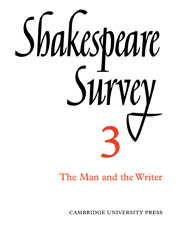Book contents
- Frontmatter
- Studies in the Life and Environment of Shakespeare Since 1900
- Shakespeare’s Deposition in the Belott-Mountjoy Suit
- Shakespeare’s Reading
- Recent Studies in Shakespeare’s Chronology
- Coriolanus and the Midlands Insurrection of 1607
- The Shakespeare Collection in the British Museum
- The Structural Pattern of Shakespeare’s Tragedies
- The ‘Meaning’ of Measure for Measure
- Hamlet and the Player Who Could NOT Keep Counsel
- Unworthy Scaffolds: A Theory for the Reconstruction of Elizabethan Playhouses
- Shakespeare in the German Open-Air Theatre
- Othello in Paris and Brussels
- Shakespeare and Denmark: 1900–1949
- International News
- A Stratford Production: Henry VIII
- The Year's Contributions to Shakespeare Studies: 1 Critical Studies
- 2 Shakespeare’s Life and Times
- 3 Textual Studies
- Index
- Plate Section
2 - Shakespeare’s Life and Times
Published online by Cambridge University Press: 28 March 2007
- Frontmatter
- Studies in the Life and Environment of Shakespeare Since 1900
- Shakespeare’s Deposition in the Belott-Mountjoy Suit
- Shakespeare’s Reading
- Recent Studies in Shakespeare’s Chronology
- Coriolanus and the Midlands Insurrection of 1607
- The Shakespeare Collection in the British Museum
- The Structural Pattern of Shakespeare’s Tragedies
- The ‘Meaning’ of Measure for Measure
- Hamlet and the Player Who Could NOT Keep Counsel
- Unworthy Scaffolds: A Theory for the Reconstruction of Elizabethan Playhouses
- Shakespeare in the German Open-Air Theatre
- Othello in Paris and Brussels
- Shakespeare and Denmark: 1900–1949
- International News
- A Stratford Production: Henry VIII
- The Year's Contributions to Shakespeare Studies: 1 Critical Studies
- 2 Shakespeare’s Life and Times
- 3 Textual Studies
- Index
- Plate Section
Summary
Nine years ago we knew that Alan Keen had discovered a copy of Hall’s Chronicle with numerous marginalia believed to have some connexion with Shakespeare’s second historical tetralogy. Now Moray McLaren has produced a book in which the marginalia are claimed to be in Shakespeare’s hand. He usefully gives an appendix in which the notes relating to the subject-matter of Richard II are set out, along with the passages from Hall that they annotate and the corresponding lines from the play. It might indeed have been better at this stage to have devoted the book to a reproduction of all the 406 notes: a basis for judgement would have been more securely provided in this way than by McLaren’s rather impulsive pleadings. Space is given, for example, to the arguments that the annotator was ‘poetically minded’ because he writes the words “Prisoners pitifully slayne”, and that he was not unfamiliar with the theatre because, like the author of Thomas of Woodstock, he used the name ‘Woodstock’ for Gloucester. Certainly there are interesting points of contact between some of the marginalia and passages in Shakespeare; there is, too, the sketch of a large-nosed face against Hall’s account of the soldier hanged for stealing the pyx; but many other parallels adduced by McLaren are altogether nugatory. Nor is it helpful to read that, if Shakespeare was a schoolmaster, he would have had to use Hall as a text-book for the teaching of English history.
- Type
- Chapter
- Information
- Shakespeare Survey , pp. 138 - 142Publisher: Cambridge University PressPrint publication year: 1950



